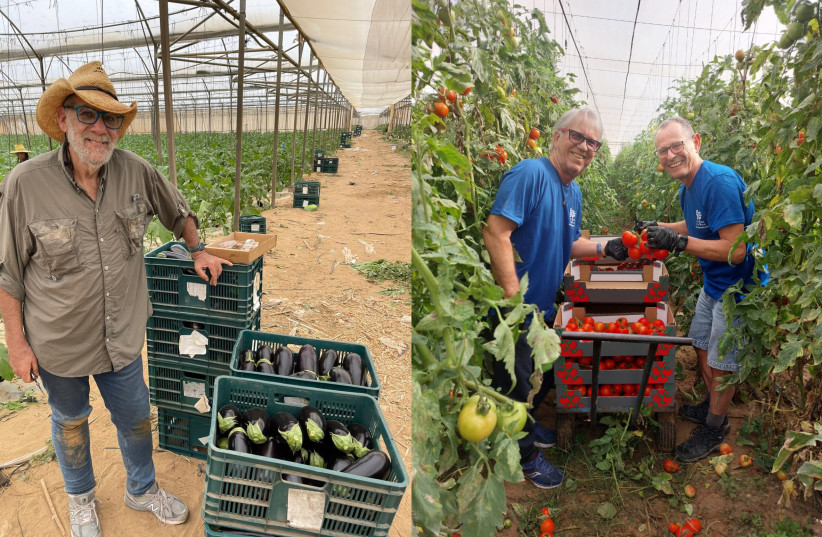Israel’s agriculture sector has been facing a crisis since the war with Hamas began on Oct. 7, with an acute labor shortage caused by farmers called up to the reserves and Palestinian workers who have been temporarily banned from working in Israel.
For more stories from The Media Line go to themedialine.org
“I want Israeli agriculture to produce more for the local market, with an emphasis on fruit and vegetables, from now on, in an orderly outline to support this goal until 2030,” Agriculture Minister Avi Dichter said in a situation assessment. “We will draft a decision-making proposal on the issue to bolster local agriculture.”
“I want Israeli agriculture to produce more for the local market, with an emphasis on fruit and vegetables, from now on, in an orderly outline to support this goal until 2030,” Agriculture Minister Avi Dichter said in a situation assessment. “We will draft a decision-making proposal on the issue to bolster local agriculture.”
In addition to the workforce losses caused by Israeli workers called to the reserves and Palestinian workers who were banned from entering Israel, many Thai workers have returned to Thailand after the onset of the war. In response to the reduced workforce, numerous volunteers from across the nation have taken the initiative to support Israel’s agricultural industry.
Joseph Gitler, the founder and chairman of Leket Israel, a prominent nongovernmental organization specializing in food rescue, has mobilized more than 10,000 volunteers to assist more than 500 Israeli farms.

Reduced workforce has substantial ramifications for Israeli farmers
Gitler said that the reduced workforce has had substantial ramifications for many Israeli farmers.
“A big chunk of Thai workers have left the country due to reasonable fear, and those who are left in the country, from our understanding, want to work more in the center of the country, where they feel more comfortable and safer,” he told The Media Line. “They [Palestinians] don’t have access, and even if they want to come in, they can’t, which is a shame because these were people making an honest living and providing for their families.”
Yuval, an Israeli farmer operating in the central Israeli city of Kfar Saba, said that he has struggled to maintain the workforce on his 440-acre farm.
“I had a big crisis in the beginning because the first 10 days I did not have any workers,” he told The Media Line. “The Palestinian workers did not come to work after Oct. 7, and the Thai workers, some of them got very scared and told me they have pressure to go back home to Thailand.”
Yuval has retained only seven workers out of the 30 who once assisted him on the farm.
According to the Coordination of Government Activities in the Territories of Israel, a decision was made to prevent entry to Israel for Palestinians in the West Bank. Before the war broke out, about 8,500 West Bank Palestinians had a permit to work in agriculture in Israel.
Abdel Al Latif Saed Al Shu’beh, a 45-year-old Palestinian from Nablus who worked on Yuval’s farm, told The Media Line that he has faced hardship in the wake of Israel’s decision to ban entry to Palestinian workers.
“I used to work with Yuval in the fields, but I have spent more than 40 days in Nablus unable to go to work,” he said. “I have seven family members I need to provide for but can’t because of the war. The government is not allowing us Palestinians to enter and work. I need my kids to survive.”
Yossi Inbar, an Israeli farmer who owns a 220-acre farm in Ohad, a moshav near the border with the Gaza Strip, told The Media Line that he was able to return to work only 10 days after the war began.
“Because we are 7 kilometers away from the Gaza Strip, we were scared and we panicked when Hamas got close to the moshav I live in,” he said. “We had to run away, and it was very difficult. We were left without a working hand, so no one was available to help harvest the vegetables from the fields, until Israeli volunteers came to help and saved the field.”
The Agriculture Ministry is continuously working to formulate additional plans for the immediate and long term.
In cooperation with the Finance Ministry, the Knesset's Economy and Finance committees recently outlined a compensation plan for farmers.
The Agriculture Ministry stressed that agriculture is different from other branches of the economy and needs to be compensated differently from businesses in the regular compensation plan, which is based on the decrease in a business’s turnover between the war period and the same period the previous year.
Lana Ikelan is a recent graduate of the Hebrew University of Jerusalem and an intern in The Media Line’s Press and Policy Student Program.
